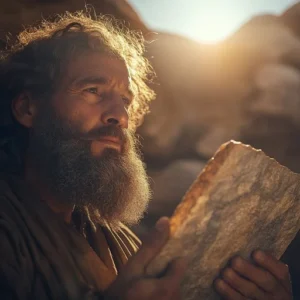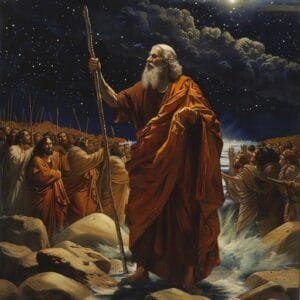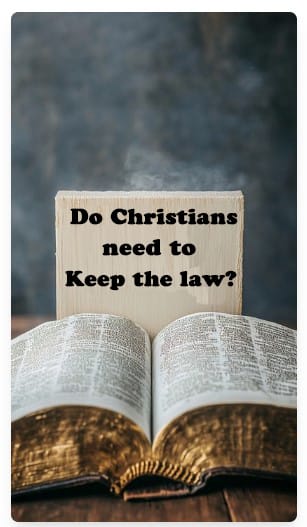 God has laws, commandments, precepts for man to live by. The world chose to ignore these commandments and was judged unrighteous except for Noah who was judged righteous. At the very least Noah walked with God and was blameless whereas mankind in general was wicked to the point that God was grieved that he had made man.These judgements would have had no basis except there existed some set of law or rules or criteria by which to judge.
God has laws, commandments, precepts for man to live by. The world chose to ignore these commandments and was judged unrighteous except for Noah who was judged righteous. At the very least Noah walked with God and was blameless whereas mankind in general was wicked to the point that God was grieved that he had made man.These judgements would have had no basis except there existed some set of law or rules or criteria by which to judge.
When Noah came out of the ark he built an altar and sacrificed to God. Then God blessed Noah and, among other things, said, “Everything that lives and moves will be food for you. Just as I gave you the green plants, I now give you everything.” (Gen 9:3) God also said, “Whenever the rainbow appears in the clouds, I will see it and remember the everlasting covenant between God and all living creatures of every kind on the earth.” (Genesis 9:16)
Later God spoke to Abram and gave him instructions. Abram was careful to obey God and found favor with God. God spoke to Isaac in Genesis 26:5 and said, “…Abraham obeyed me and kept my requirements, my commands, my decrees and my laws.”
 Some five hundred years later God dealt with Moses on Mount Sinai. There God made a covenant with the Israelites. This covenant was to establish the Israelites as God’s chosen people. (Ex 19:5) He then had Moses set before the people (Israelites) laws of civil administration (Ex 21:1ff) that told the people how to apply God’s commandments to their everyday lives in the wilderness. God wrote by his own finger the ten commandments on tablets of stone. These commandments are the words of the covenant between God and the Israelites. (Ex 24:12 and Ex 34:28)
Some five hundred years later God dealt with Moses on Mount Sinai. There God made a covenant with the Israelites. This covenant was to establish the Israelites as God’s chosen people. (Ex 19:5) He then had Moses set before the people (Israelites) laws of civil administration (Ex 21:1ff) that told the people how to apply God’s commandments to their everyday lives in the wilderness. God wrote by his own finger the ten commandments on tablets of stone. These commandments are the words of the covenant between God and the Israelites. (Ex 24:12 and Ex 34:28)
During the next twelve hundred years the nation of Israel became divided into the Southern Kingdom consisting of the tribes of Judah and Benjamin and the Northern Kingdom made up of the other ten tribes of Jacob. After civil wars, subjection to conquering foreign powers, exiles and restoration, what remained of the nation of Israel was mostly the tribe of Judah with only remnants of the other tribes to be found. In this way the ancient nation of Israel became known as the “Jews”.
After the occupation of Judea by the Romans, Jesus began his ministry on earth and established the Kingdom of Heaven. He taught the people with authority. He said, “Do not think that I have come to abolish the Law or the Prophets; I have not come to abolish them but to fulfill them.” (Mat 5:17) Jesus upheld the Law and honored the relationship between Yahweh and the Israelites (Jews). But he taught them that the Kingdom of Heaven was bigger than the kingdom or nation of Israel that existed under the Law of Moses. He said to them, “Therefore every teacher of the law who has been instructed about the kingdom of heaven is like the owner of a house who brings out of his storeroom new treasures as well as old.” (Matthew 13:52) He also said, “No one sews a patch of unshrunk cloth on an old garment, for the patch will pull away from the garment, making the tear worse. Neither do men pour new wine into old wineskins. If they do, the skins will burst, the wine will run out and the wineskins will be ruined. No, they pour new wine into new wineskins, and both are preserved.” (Mat 9:16-17)
Now the Pharisees considered themselves to be separated from common people of the Jews and devoted themselves to the perfect keeping of the Law of Moses. The Pharisees were the “experts at the Law”. But Jesus said to the people, “For I tell you that unless your righteousness surpasses that of the Pharisees and the teachers of the law, you will certainly not enter the kingdom of heaven. (Mat 5:20). We see here that the Kingdom of Heaven that Jesus came to establish has higher standards or stricter requirements than those laid out by the Law of Moses. Jesus went on to teach and explain those higher standards in the Sermon on the Mount. (Matthew chapters 5,6 and 7). Notice how his teachings are contrasted with the teachings and practices of the Pharisees. The words of Jesus taught his followers how to apply God’s commandments to their lives as subjects (citizens) of the Kingdom of Heaven!
Jesus finished his sermon with words too important to pass over without emphasis:
“Therefore everyone who hears these words of mine and puts them into practice is like a wise man who built his house on the rock. The rain came down, the streams rose, and the winds blew and beat against that house; yet it did not fall, because it had its foundation on the rock. But everyone who hears these words of mine and does not put them into practice is like a foolish man who built his house on sand. The rain came down, the streams rose, and the winds blew and beat against that house, and it fell with a great crash.”
So it seems to me that if someone wants to be an Israelite he should be living by the Law of Moses but to enter into the Kingdom of Heaven one should be living by the WORDS OF JESUS. Now, about that new covenant….
Jesus came and established a kingdom under the authority given him by the Father. In order to establish this kingdom he had to accomplish certain things. He first had to describe the kingdom – it’s attributes, boundaries, benefits, and requirements. In doing so he differentiated his kingdom from all others. Also, he had to establish the authority of his kingdom which was often contested and defended. He also had to defeat his enemies, those that opposed his authority and his mission. In addition to these things he taught the rules, laws, precepts and commandments that those of his kingdom would live by.
To enjoy citizenship in the Kingdom that Jesus taught, we must live by his rules or words or commandments. This is the covenant that we should be concerned about.


